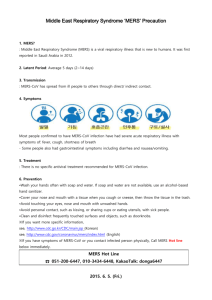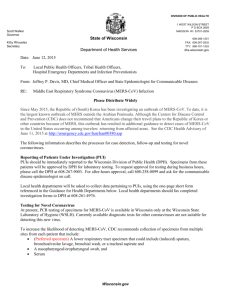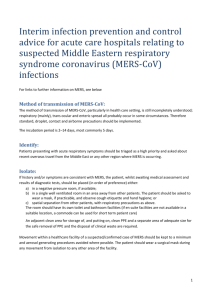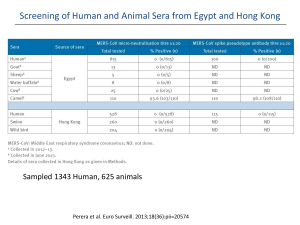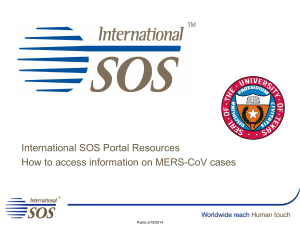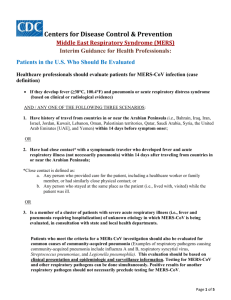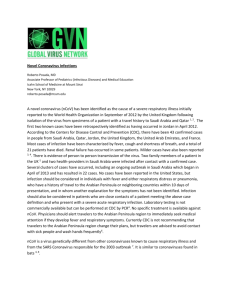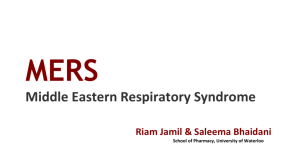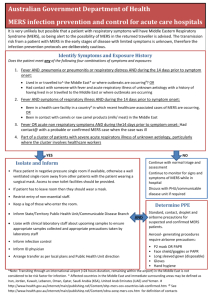Middle-East Respiratory Syndrome Coronavirus (MERS-CoV) Update Thursday, May 1, 2014
advertisement
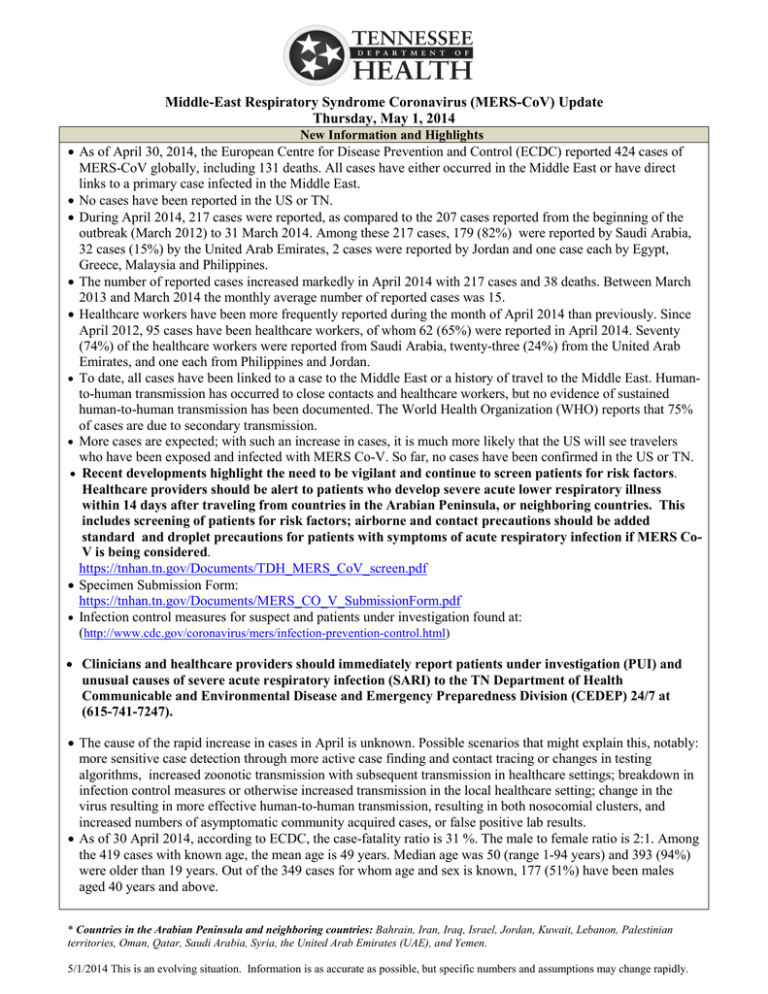
Middle-East Respiratory Syndrome Coronavirus (MERS-CoV) Update Thursday, May 1, 2014 New Information and Highlights • As of April 30, 2014, the European Centre for Disease Prevention and Control (ECDC) reported 424 cases of MERS-CoV globally, including 131 deaths. All cases have either occurred in the Middle East or have direct links to a primary case infected in the Middle East. • No cases have been reported in the US or TN. • During April 2014, 217 cases were reported, as compared to the 207 cases reported from the beginning of the outbreak (March 2012) to 31 March 2014. Among these 217 cases, 179 (82%) were reported by Saudi Arabia, 32 cases (15%) by the United Arab Emirates, 2 cases were reported by Jordan and one case each by Egypt, Greece, Malaysia and Philippines. • The number of reported cases increased markedly in April 2014 with 217 cases and 38 deaths. Between March 2013 and March 2014 the monthly average number of reported cases was 15. • Healthcare workers have been more frequently reported during the month of April 2014 than previously. Since April 2012, 95 cases have been healthcare workers, of whom 62 (65%) were reported in April 2014. Seventy (74%) of the healthcare workers were reported from Saudi Arabia, twenty-three (24%) from the United Arab Emirates, and one each from Philippines and Jordan. • To date, all cases have been linked to a case to the Middle East or a history of travel to the Middle East. Humanto-human transmission has occurred to close contacts and healthcare workers, but no evidence of sustained human-to-human transmission has been documented. The World Health Organization (WHO) reports that 75% of cases are due to secondary transmission. • More cases are expected; with such an increase in cases, it is much more likely that the US will see travelers who have been exposed and infected with MERS Co-V. So far, no cases have been confirmed in the US or TN. • Recent developments highlight the need to be vigilant and continue to screen patients for risk factors. Healthcare providers should be alert to patients who develop severe acute lower respiratory illness within 14 days after traveling from countries in the Arabian Peninsula, or neighboring countries. This includes screening of patients for risk factors; airborne and contact precautions should be added standard and droplet precautions for patients with symptoms of acute respiratory infection if MERS CoV is being considered. https://tnhan.tn.gov/Documents/TDH_MERS_CoV_screen.pdf • Specimen Submission Form: https://tnhan.tn.gov/Documents/MERS_CO_V_SubmissionForm.pdf • Infection control measures for suspect and patients under investigation found at: (http://www.cdc.gov/coronavirus/mers/infection-prevention-control.html) • Clinicians and healthcare providers should immediately report patients under investigation (PUI) and unusual causes of severe acute respiratory infection (SARI) to the TN Department of Health Communicable and Environmental Disease and Emergency Preparedness Division (CEDEP) 24/7 at (615-741-7247). • The cause of the rapid increase in cases in April is unknown. Possible scenarios that might explain this, notably: more sensitive case detection through more active case finding and contact tracing or changes in testing algorithms, increased zoonotic transmission with subsequent transmission in healthcare settings; breakdown in infection control measures or otherwise increased transmission in the local healthcare setting; change in the virus resulting in more effective human-to-human transmission, resulting in both nosocomial clusters, and increased numbers of asymptomatic community acquired cases, or false positive lab results. • As of 30 April 2014, according to ECDC, the case-fatality ratio is 31 %. The male to female ratio is 2:1. Among the 419 cases with known age, the mean age is 49 years. Median age was 50 (range 1-94 years) and 393 (94%) were older than 19 years. Out of the 349 cases for whom age and sex is known, 177 (51%) have been males aged 40 years and above. * Countries in the Arabian Peninsula and neighboring countries: Bahrain, Iran, Iraq, Israel, Jordan, Kuwait, Lebanon, Palestinian territories, Oman, Qatar, Saudi Arabia, Syria, the United Arab Emirates (UAE), and Yemen. 5/1/2014 This is an evolving situation. Information is as accurate as possible, but specific numbers and assumptions may change rapidly. Current Clinical Consideration Highlights • Clinicians and healthcare providers should immediately report patients under investigation (PUI) and unusual causes of severe acute respiratory infection (SARI) to the TN Department of Health Communicable and Environmental Disease and Emergency Preparedness Division (CEDEP) 24/7 at (615-741-7247). • A patient under investigation (PUI) is a person with: (1) An acute respiratory infection, which may include fever (> 38°C, 100.4°F) and cough; AND (2) Suspicion of pulmonary parenchymal disease (e.g., pneumonia or acute respiratory distress syndrome based on clinical or radiological evidence of consolidation); AND EITHER (3) History of travel from the Arabian Peninsula* or neighboring countries within 14 days before symptom onset OR (4) Close contact with a symptomatic traveler who developed fever and acute respiratory illness (not necessarily pneumonia) within 14 days after traveling from countries in or near the Arabian Peninsula*. (a) (Close contact is defined as (a) any person who provided care for the patient, including healthcare workers and family members, or similar physical contact, or (b) any person who stayed at the same place (e.g. lived with, visited) as the patient while the patient was ill. OR (5) Is a member of a cluster of patients with severe acute respiratory illness (e.g. fever and pneumonia requiring hospitalization) of unknown etiology in which MERS-CoV is being evaluated, in consultation with the state and local health department. • Testing for MERS-CoV and other respiratory pathogens can be done simultaneously and positive results for another respiratory pathogen should not necessarily preclude testing for MERS-CoV. • To improve the ability of TDH to detect any unusual cause of severe acute respiratory infection (SARI, defined as fever and cough requiring hospitalization) in TN, please notify public health of: (1) Clusters of SARI [fever and cough requiring hospitalization, cause unknown]. “Cluster” is defined as 2 or more patients with onset of disease within a 2-week period among people linked by a specific setting (e.g., hospital, workplace, household, classroom, extended family, camp, barrack, dormitory). If illnesses remain unexplained, testing for MERS-CoV should be considered, in consultation with state and local health departments. (2) Healthcare workers who have cared for patients with SARI, particularly patients requiring ICU care. • The state public health laboratory has the capacity for MERS-CoV testing in TN. MERS-CoV testing would require pre-approval by CEDEP medical epidemiologist (Kainer, Moore, Jones or Dunn). All may be reached through the CEDEP phone number (615-741-7247). The specimen submission form is located on the TN Health Alert Network landing page at https://tnhan.tn.gov/default.aspx or at https://tnhan.tn.gov/Documents/MERS_CO_V_SubmissionForm.pdf Tennessee Department of Health Activity Update Current Case Definition Suspect Cases/PUI in Tennessee State PH Lab: Laboratory Testing Communications • Detailed case definition information can be found below or at the following link (http://www.cdc.gov/coronavirus/mers/interim-guidance.html). • None in Tennessee • Guidelines for specimen submission: (http://www.cdc.gov/coronavirus/mers/guidelines-clinical-specimens.html). The TN State public health lab has capacity to perform MERS-CoV testing. Testing needs to be preapproved by a CEDEP medical epidemiologist (Kainer, Moore, Jones or Dunn); call the CEDEP number: (615) 741-7247. The specimen submission form is located at https://tnhan.tn.gov/Documents/MERS_CO_V_SubmissionForm.pdf or can be found on the TN Health Alert Network landing page at https://tnhan.tn.gov/default.aspx. • Serological test developed by CDC (available at CDC) • The CDC MERS-CoV and WHO Global Alert and Response Disease Outbreak News websites are resources for updated and detailed guidance documents: (http://www.cdc.gov/coronavirus/mers/faq.html) (http://www.who.int/csr/disease/coronavirus_infections/en/) 5/1/2014– This is an evolving situation. Information is as accurate as possible, but specific numbers and assumptions may change rapidly. Hospital Infection Control • Hospitals reminded of the need to screen for recent travel to the Arabian Peninsula* and neighboring countries in coordination with MERS-CoV symptoms on patient admission, especially in light of marked increase in MERS-CoV cases in April 2014.. • Infection control measures for suspect and patients under investigation found at: (http://www.cdc.gov/coronavirus/mers/infection-prevention-control.html) • Hospitals advised of CDC checklists available for healthcare facility and provider preparedness. Available at (http://www.cdc.gov/coronavirus/mers/preparedness/index.html) Information on MERS-CoV MERS-CoV • Middle East Respiratory Syndrome (MERS) is a viral illness that was first reported in Saudi Arabia in April 2012. It is caused by MERS Coronavirus (MERS-CoV) which is a beta coronavirus. MERS-CoV in the past was referred to as “novel coronavirus” or “nCoV.” Although genetically similar to the SARS coronavirus, it is not the same coronavirus that caused SARS in 2003. International Update Cases in the US/ Patients under investigation (PUI) Travel advisories/ outreach Healthcare Preparedness • No cases in the US • Inbound travel: (1) information and enhanced surveillance by customs and border protection (CBP); (2) no screening of travelers at point of entry; (3) air ambulances to notify PH if transferring patients from affected areas; (4) CDC is performing outreach to institutions of higher learning as students return from affected areas; (5) social media: twitter @cdctravel; facebook: CDC travelers health • Outbound travel: CDC has issued a travel watch (Level 1), Practice Usual Precautions. Travelers are advised to see a healthcare provider if develop fever and symptoms of lower respiratory infection within 14 days of travel from the Arabian Peninsula. Travelers should tell the healthcare provider about recent travel. http://wwwnc.cdc.gov/travel/notices/watch/coronavirus-saudi-arabia-qatar • Preparedness checklists and resources for healthcare facilities and providers have been posted by CDC recently (http://www.cdc.gov/coronavirus/mers/preparedness/index.html) Key Websites: http://www.cdc.gov/coronavirus/mers/faq.html, http://www.cdc.gov/coronavirus/mers/interim-guidance.html,; http://www.who.int/csr/disease/coronavirus_infections/en/ ; http://www.ecdc.europa.eu/en/healthtopics/coronavirusinfections/Pages/index.aspx 5/1/2014– This is an evolving situation. Information is as accurate as possible, but specific numbers and assumptions may change rapidly. 5/1/2014– This is an evolving situation. Information is as accurate as possible, but specific numbers and assumptions may change rapidly.
